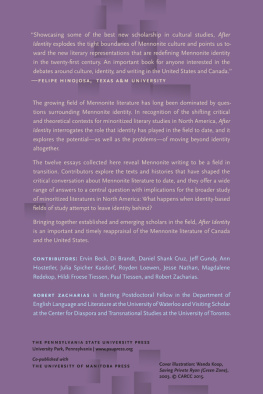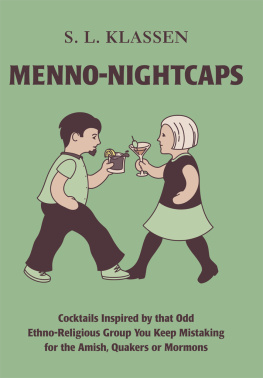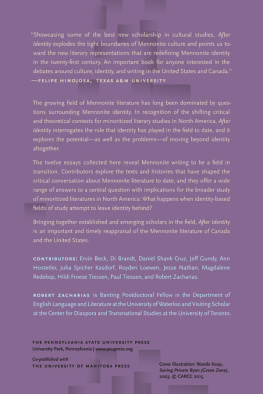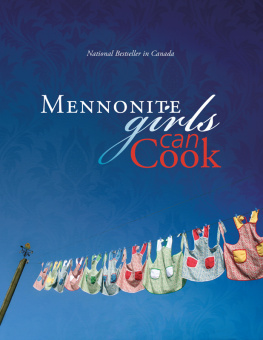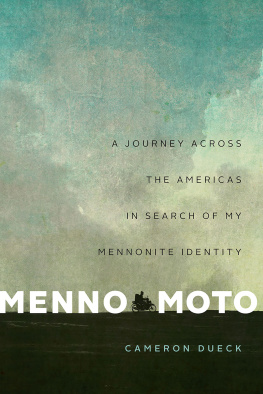After Identity
After Identity

Mennonite Writing in North America
Edited by Robert Zacharias
The Pennsylvania State University Press
University Park, Pennsylvania
Library of Congress
Cataloging-in-Publication Data
After identity : Mennonite writing in North America / edited by Robert Zacharias.
pagescm
Summary: An interdisciplinary reappraisal of the field of Mennonite writing in Canada and the United States. Essays explore the unique configuration of religious and ethnic cultural differenceProvided by publisher.
Includes bibliographical references and index.
ISBN 978-0-271-07037-7 (cloth : alk. paper)
1. Canadian literatureMennonite authorsHistory and criticism.
2. American literatureMennonite authorsHistory and criticism.
3. Identity (Psychology) in literature.
I. Zacharias, Robert, 1977 , editor.
PR 9188.2. M 45A35 2015
810.99212897dc23 2015014640
Published 2015 by The Pennsylvania State University Press
in association with The University of Manitoba Press
Copyright 2015
The Pennsylvania State University
All rights reserved
Printed in the United States of America
Published by
The Pennsylvania State University Press,
University Park, PA 168021003
The Pennsylvania State University Press
is a member of the
Association of American University Presses.
It is the policy of The Pennsylvania State University Press to
use acid-free paper. Publications on uncoated stock satisfy
the minimum requirements of American National Standard
for Information SciencesPermanence of Paper for
Printed Library Material, ansi z39.481992.
CONTENTS
Introduction
After Identity: Mennonite/s Writing in North America
Robert Zacharias
Part 1:
Reframing Identity
Chapter 1 / The Autoethnographic Announcement and the Story
Julia Spicher Kasdorf
Chapter 2 / A Mennonite Fin de Sicle: Exploring Identity at the Turn of the Twenty-First Century
Royden Loewen
Chapter 3 / Mennonite Transgressive Literature
Ervin Beck
Chapter 4 / Double Identity: Covering the Peace Shall Destroy Many Project
Paul Tiessen
Chapter 5 / After Ethnicity: Gender, Voice, and an Ethic of Care in the Work of Di Brandt and Julia Spicher Kasdorf
Ann Hostetler
Chapter 6 / The Mennonite Thing: Identity for a Post-Identity Age
Robert Zacharias
Part 2:
Expanding Identity
Chapter 7 / In Praise of Hybridity: Reflections from Southwestern Manitoba
Di Brandt
Chapter 8 / Queering Mennonite Literature
Daniel Shank Cruz
Chapter 9 / Toward a Poetics of Identity
Jeff Gundy
Chapter 10 / Question, Answer
Jesse Nathan
Chapter 11 / Is Menno in There? The Case of The Man Who Invented Himself
Magdalene Redekop
Chapter 12 / After Identity: Liberating the Mennonite Literary Text
Hildi Froese Tiessen
All books are shared efforts in one sense or another, and collections of essays are unavoidably so. Nonetheless, After Identity was an especially collaborative project, and I am happy to acknowledge the many capable hands that helped to craft it. In the fall of 2012, following a Mennonite/s Writing conference at Eastern Mennonite University, Julia Spicher Kasdorf invited me to help organize a symposium exploring the role that identity was playing in the critical conversation about Mennonite writing in North America. We invited five Canadian and five American scholars of Mennonite writing to join us at Penn State University for an intensive four-day symposium entitled After Identity: Mennonite/s Writing in North America. In May 2013, Julia hosted ten of usDi Brandt was unable to travel but participated via emailfor a week of productive and occasionally heated discussions about the state of the field. Early drafts of the papers included in this collection were circulated in advance, and each paper was given an hours focused consideration. These conversations were deepened by the participation of scholars from the Penn State Department of English, who joined us for sessions connected with their own areas of considerable expertise. To Hester Blum, Tina Chen, Chris Castiglia, Toni Jensen, and Benjamin Schreier: my sincere thanks for your time, your insights, and your hospitality. This collection is much stronger because of your engaged participation. Thanks, too, to Henry James Morello, of the Department of Comparative Literature and the Department of Spanish, Italian, and Portuguese, for hosting a viewing of Carlos Reygadass Stellet Licht (Silent Light), and to Stephen Byler, author of Searching for Intruders, who joined the symposium to read from a remarkable memoir in progress.
The critical discussions at the After Identity symposium constituted the first round of editing for these essays; as such, they were foundational to the final shape of the After Identity book. I remain most grateful to each of the symposium participantsErvin Beck, Di Brandt, Daniel Shank Cruz, Jeff Gundy, Ann Hostetler, Julia Spicher Kasdorf, Royden Loewen, Jesse Nathan, Magdalene Redekop, Hildi Froese Tiessen, and Paul Tiessenfor their time, efforts, and critical generosity throughout that week and for their patience and efforts throughout the substantial revision process that followed it. Thanks, in particular, go to Julia, for her generosity in inviting me to join her in planning the symposium, for her deft organizing, able hosting, and insight throughout the week, and for her encouragement to take on the editing of this volume. I also want to acknowledge and express my appreciation to the following Penn State partners for their generous support of the symposium: the Max Kade German-American Research Institute; the Center for American Literary Studies; the Institute for Arts and Humanities; Mark Morrisson and the Department of English; the Department of History; the Latin American Studies Program; and the University Libraries. I also want to express my sincere thanks to Kathryn Yahner, Charlee Redman, and the rest of the editorial team at Penn State University Press, who responded enthusiastically to the original book proposal, championed the collection through its early stages, and ably guided it through production. I am also grateful to Glenn Bergen and the University of Manitoba Press, who partnered with us to complete the book and distribute it in Canada, and to Dallas Harrison for his careful copyediting. The remarkable image on the cover of this collection is Saving Private Ryan (2003), a painting in the Green Zone series by Wanda Koop, a Canadian artist of Mennonite descent. The portrait at the center of the painting can be viewed as either coming into focus or expanding into pieces, a productive ambiguity that I find most fitting for the essays collected here.
During the time between the symposium and this publication, my research has been enabled by two generous postdoctoral fellowships: I held a Social Sciences and Humanities Research Council of Canada Postdoctoral Fellowship in the Centre for Diaspora and Transnational Studies (CDTS) at the University of Toronto, and a Banting Postdoctoral Fellowship in the Department of English Language and Literature at the University of Waterloo. I want to thank Dr. Ato Quayson, director of CDTS, and Dr. Winfried Siemerling at Waterloo, who supervised these fellowships, for their encouragement of my work on this project. I also want to thank the anonymous readers who read the manuscript and offered valuable feedback on how to improve it; Kit Dobson for his generous and timely feedback on early versions of my introduction and chapter; and Hildi Froese Tiessen for her translations of German passages in the collection.

